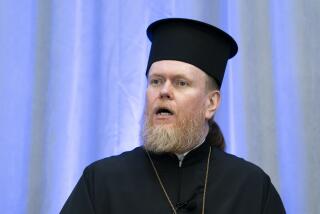BREA : Pilgrimage to Bosnia Turns Humanitarian
- Share via
When Patrice Wilson went to a small village in Bosnia-Herzegovina last month, it was mainly for a spiritual reason. But after seeing the misery in the war-torn country, she wants to go back, this time for a more earthly purpose.
“I can’t come home to the U.S. and do nothing,” Wilson said as she recounted the horrors and suffering she saw. “What’s going on there is horrible, much worse than what the Nazis did in Germany.”
Wilson, her mother, Elaine Starbuck, and friends Evelyn Pretkus and Carol Brassfield, visited Medjugorje, a village about 60 miles west of Sarajevo. The group of devout Catholics spent nine days in the village where the Virgin Mary is said to be appearing to six children.
Wilson, 36, and Starbuck, 56, are Brea residents. Pretkus, 38, lives in Diamond Bar, and Brassfield, 53, resides in Glendora.
They went there to invite the children to come to the United States and speak before a religious conference planned this November in Irvine, Wilson said.
Because of the war, they decided to take along clothing and medicine to give to the villagers.
The women said they returned home with little else than what they were wearing. They left behind their shoes, clothes and money. They brought home stories too horrible to comprehend, they said.
Wilson said she plans to return in May and take more medicine and clothing. “It won’t be on a huge scale, but I’ll take whatever I can,” she said. “What is important is to give them hope, to let them know that they have not been forgotten.”
While in Medjugorje, the women stayed with a family that Starbuck came to know when she visited the village on a similar pilgrimage in 1986. She also went there in 1987.
While there, Starbuck said they were told about a father and mother of a Muslim family who were decapitated in front of their children. The older girls were raped and the boys were mutilated, she said.
Starbuck said she was also told of tortures, kidnaping and rapes, reportedly perpetrated by Serbian soldiers.
Medjugorje, which is inhabited mostly by Croatians, is relatively untouched compared to other villages in Bosnia, Starbuck said.
The fighting is about 10 miles away, but all the men in the village go to the front at least 15 days a month to fight against the attacking Serbians, she said.
Hundreds of refugees, who have fled other villages, have occupied empty buildings, Starbuck said. A detachment from the United Nations peacekeeping force is based there, she said, but she did not see any international relief agency helping the refugees.
Some of the villagers have taken the refugees into their own homes, she said.
“Food that you normally throw away here in America is fresh produce to them,” Pretkus said.
Pretkus said she went to Bosnia, her first trip, partly because of her Croatian ancestry. She said she wanted to understand the events happening there and know more about the people.
“I was amazed at how giving the people were,” she said. “They invited us into their homes. Lunch sometimes was just bread and water, but it was wonderful.”
More to Read
Sign up for Essential California
The most important California stories and recommendations in your inbox every morning.
You may occasionally receive promotional content from the Los Angeles Times.










